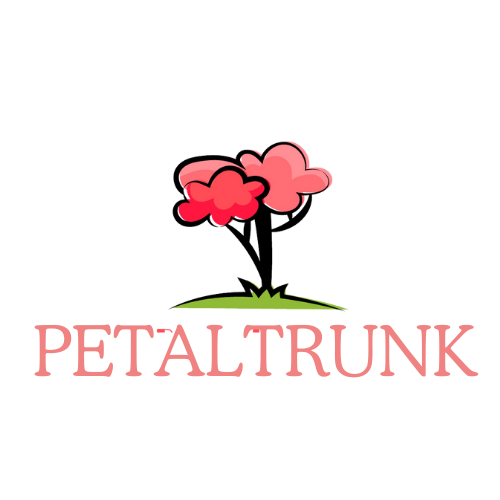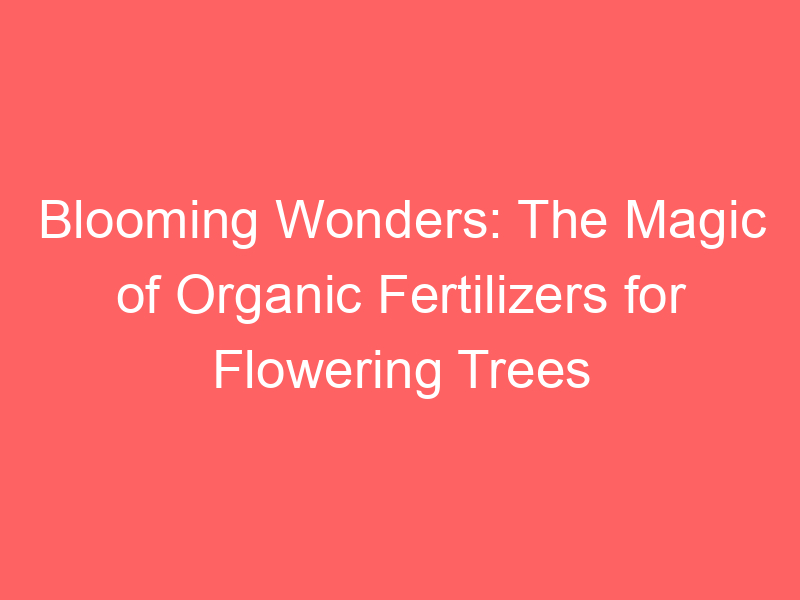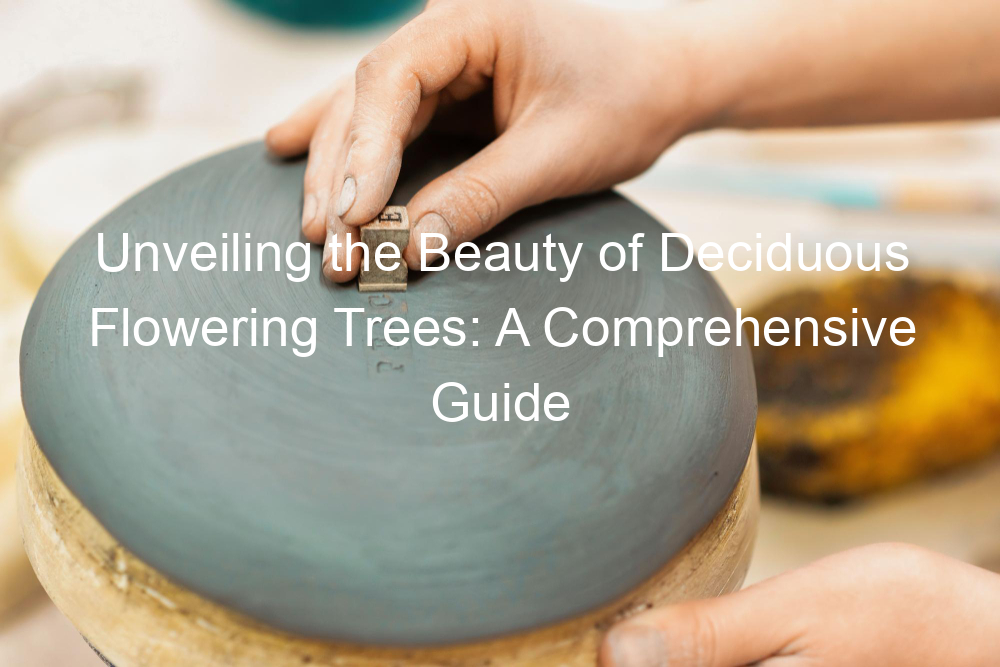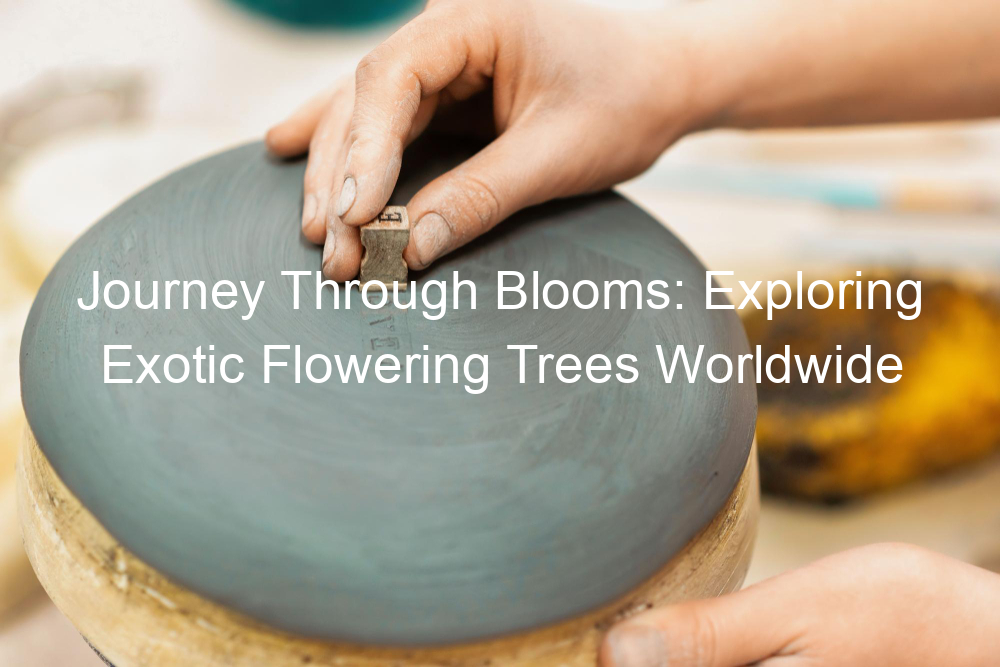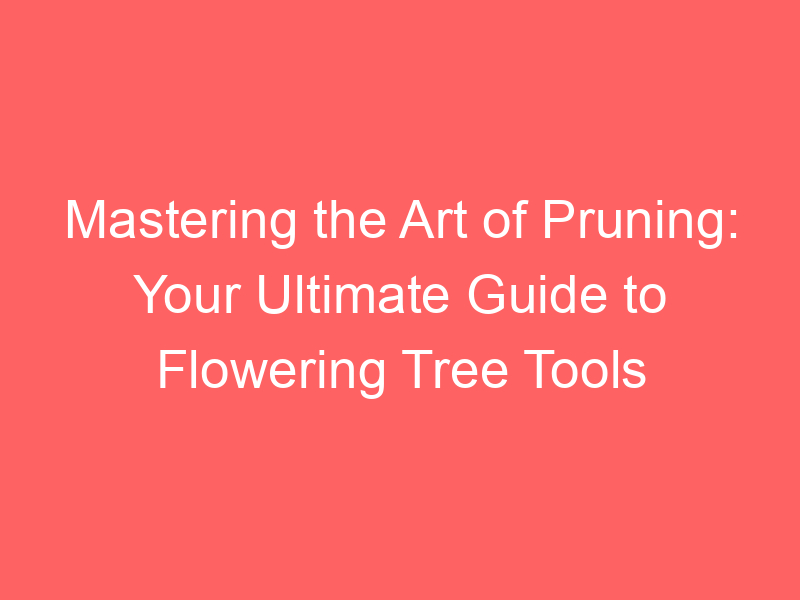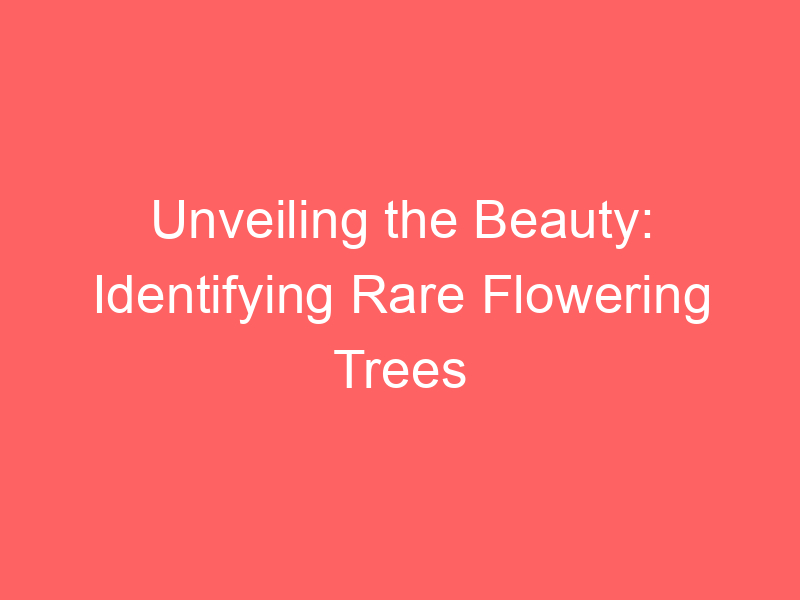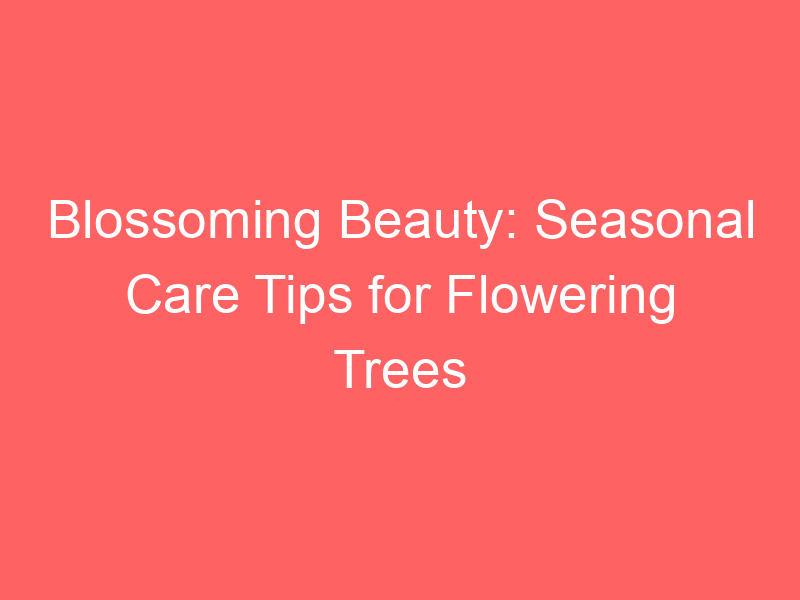Introduction to Organic Fertilizers and Flowering Trees
Welcome to our comprehensive guide on organic fertilizers and flowering trees. This article aims to provide nature lovers with valuable insights into the importance of organic fertilizers and an overview of flowering trees. We will delve into the magic of organic fertilizers, organic tree care for flowering trees, and the use of eco-friendly fertilizers in flowering tree care. We will also discuss organic plant nutrition best practices and provide a comprehensive guide on the best organic fertilizers for trees.
-
- Understanding the Importance of Organic Fertilizers
Organic fertilizers are a crucial component in maintaining the health and vitality of flowering trees. They are derived from plant, animal, or mineral resources, and are rich in essential nutrients that promote healthy growth and flowering. Organic fertilizers improve soil structure, enhance water retention, and encourage beneficial soil microorganisms. According to a Wikipedia study, organic fertilizers can increase plant productivity by up to 50% compared to synthetic fertilizers.
-
- Overview of Flowering Trees
Flowering trees are a beautiful addition to any landscape, providing color, fragrance, and shade. They come in a variety of species, each with its unique characteristics, growth habits, and care requirements. Some popular flowering trees include cherry blossoms, magnolias, and dogwoods. These trees not only enhance the aesthetic appeal of a place but also contribute to biodiversity by providing habitat and food for various wildlife species.
Stay tuned as we delve deeper into the magic of organic fertilizers, their role in organic tree care, and how to use them effectively for flowering trees. We will also share best practices in organic plant nutrition and guide you through the best organic fertilizers for trees. Let’s embark on this green journey together!
The Magic of Organic Fertilizers
Organic fertilizers are a gift from nature to all garden enthusiasts and nature lovers. They are not just beneficial for plants, but also play a significant role in maintaining the overall health of our environment. Let’s delve into the magic of organic fertilizers and understand their benefits.
Benefits of Organic Fertilizers
Organic fertilizers are packed with numerous benefits that can transform your garden into a lush, green paradise. Here are some of the key benefits:
- Improving soil health: Organic fertilizers are rich in nutrients that improve the fertility and structure of the soil. They increase the organic matter in the soil, which enhances its water-holding capacity and reduces soil erosion. This results in a healthy and fertile soil that is perfect for the growth of flowering trees.
- Boosting plant growth: Organic fertilizers provide essential nutrients to the plants, promoting their healthy growth. They release nutrients slowly, ensuring that the plants receive a steady supply of nutrients over a longer period. This leads to stronger and healthier plants.
- Enhancing flowering and fruiting: Organic fertilizers are known to enhance the flowering and fruiting of plants. They provide the necessary nutrients required for the growth of flowers and fruits, leading to a vibrant and fruitful garden.
Organic fertilizers are a boon to nature lovers who wish to see their gardens flourish with healthy and vibrant flowering trees. They not only nourish the plants but also contribute to the health of our planet by reducing the use of chemical fertilizers. So, embrace the magic of organic fertilizers and witness the transformation in your garden.
Understanding Natural Fertilizers
When it comes to nourishing your flowering trees, natural fertilizers are a fantastic choice. They are not only beneficial for the environment but also provide essential nutrients to your trees. Let’s take a closer look at three common types of natural fertilizers: compost, manure, and bone meal.
-
- Compost
Compost is a rich, organic material made from decomposed plant and food waste. It is an excellent source of nutrients for flowering trees. Compost improves the soil structure, helps retain moisture, and encourages beneficial microorganisms. According to a Wikipedia article, compost can be made at home using kitchen scraps, yard waste, and other organic materials.
-
- Manure
Manure, specifically from herbivorous animals, is another effective natural fertilizer. It is rich in nitrogen, phosphorus, and potassium – essential nutrients for plant growth. Manure also improves soil fertility and structure. However, it’s important to use well-rotted manure to avoid burning the roots of your trees.
-
- Bone Meal
Bone meal is made from ground animal bones and is a great source of phosphorus, which is crucial for root development and flowering. It also contains calcium, another essential nutrient for plants. However, use bone meal sparingly as too much can lead to nutrient imbalances in the soil.
The natural fertilizers like compost, manure, and bone meal can significantly enhance the health and beauty of your flowering trees. They not only provide essential nutrients but also improve soil health, making it a more conducive environment for your trees to thrive.
Organic Tree Care for Flowering Trees
Flowering trees are a beautiful addition to any garden, but they require special care to thrive. One of the most important aspects of tree care is providing the right nutrients. Organic fertilizers are a great way to do this, as they are not only beneficial for the tree but also for the environment.
Fertilizers for Trees: Organic Options
In fertilizing your flowering trees, there are several organic options to choose from. These fertilizers are made from natural materials and do not contain any synthetic chemicals. Here are some of the best organic fertilizers for trees:
- Organic compost: Compost is a rich source of nutrients and can be made at home from kitchen scraps and yard waste. It improves the soil structure and provides essential nutrients for tree growth.
- Organic plant food: Organic plant food is another great option. It is usually made from natural materials like bone meal, fish emulsion, and seaweed extract. These plant foods provide a balanced diet for your trees and help them grow strong and healthy.
- Homemade organic fertilizers: If you’re feeling adventurous, you can even make your own organic fertilizers at home. Common ingredients include coffee grounds, eggshells, and banana peels. These homemade fertilizers are cost-effective and eco-friendly.
Apply your chosen organic fertilizer at least once a year, ideally in the spring when the tree starts to grow new leaves. This will ensure your flowering trees get the nutrients they need to bloom beautifully.
Organic Gardening: Care for Flowering Trees
Flowering trees are a beautiful addition to any garden. However, they require a certain level of care to ensure they thrive and bloom to their full potential. Here are some organic gardening tips to help you care for your flowering trees.
-
- Proper watering techniques
Watering is a crucial part of tree care. Too little water and the tree may wilt and die; too much, and you risk root rot. It’s important to water deeply and infrequently, allowing the soil to dry out between waterings. This encourages the tree’s roots to grow deep into the ground, making it more stable and able to withstand drought conditions. A good rule of thumb is to water once a week during dry periods, soaking the soil to a depth of at least 6 inches.
-
- Pruning tips
Pruning is essential for the health and aesthetics of your flowering trees. It helps to remove dead or diseased branches, allows for better air circulation, and can encourage more blooms. Always prune in late winter or early spring before new growth starts, and make sure to use sharp, clean tools to avoid spreading disease. Remember, less is more when it comes to pruning. It’s better to make a few well-placed cuts than to over-prune and potentially harm the tree.
-
- Seasonal care
Each season brings its own set of challenges and tasks for tree care. In spring, apply a layer of organic mulch around the base of the tree to conserve moisture and suppress weeds. Summer is the time to monitor for pests and diseases, as well as to water regularly if the weather is dry. In fall, rake up and dispose of fallen leaves to prevent the spread of disease. Finally, in winter, protect young trees from frost with a tree wrap or burlap.
By following these organic gardening tips, you can ensure your flowering trees remain healthy and vibrant, providing beauty and shade for years to come.
Flowering Tree Care: Using Eco-friendly Fertilizers
As nature lovers, we all want to keep our flowering trees healthy and blooming. One way to achieve this is by using eco-friendly fertilizers. These fertilizers are not only beneficial for our trees but also for our environment. Let’s dive deeper into the world of eco-friendly fertilizers and learn how to use them effectively.
-
- Benefits of eco-friendly fertilizers
Eco-friendly fertilizers, often referred to as organic or natural fertilizers, offer numerous benefits. They are derived from plant, animal, or mineral resources, and are free from synthetic chemicals. This makes them safer for the environment and for the creatures living in it.
These fertilizers improve the soil structure and increase its ability to hold water and nutrients. They also encourage the growth of beneficial microorganisms, which help in nutrient absorption. Moreover, unlike synthetic fertilizers, they don’t contribute to water pollution. According to a Wikipedia article, organic fertilizers can reduce the risk of harmful algal blooms in water bodies, which are often caused by the runoff of synthetic fertilizers.
-
- How to use eco-friendly fertilizers
Using eco-friendly fertilizers is quite simple. First, you need to determine the nutritional needs of your flowering trees. This can be done by observing the color and growth rate of the leaves. Once you know what nutrients your tree needs, you can select an appropriate eco-friendly fertilizer.
Generally, you should apply the fertilizer to the soil around the base of the tree, avoiding direct contact with the trunk. The best times to fertilize are early spring and late fall, when the tree is either preparing for or recovering from the growing season. Always follow the instructions on the fertilizer package to ensure you’re using the correct amount.
-
- Examples of eco-friendly fertilizers
There are many types of eco-friendly fertilizers available on the market. Some examples include compost, manure, bone meal, and seaweed extracts. Compost is a great all-around fertilizer, while bone meal is high in phosphorus, which is essential for flower production. Seaweed extracts are rich in micronutrients and can improve the overall health of your tree.
Remember, the best fertilizer for your tree depends on its specific nutritional needs. So, don’t hesitate to experiment with different types until you find the one that works best.
Eco-friendly fertilizers are a great choice for those who want to take care of their flowering trees in a sustainable way. They offer numerous benefits, are easy to use, and come in a variety of types to suit different nutritional needs. So, why not give them a try and see the difference they can make in your garden?
Organic Plant Nutrition: Best Practices
As nature lovers, it’s crucial to understand how we can best nourish our beloved flowering trees. This section will delve into the world of organic plant nutrition, highlighting its importance and best practices.
- Understanding Plant Nutrition
Plant nutrition is the study of the chemical elements necessary for plant growth. These elements are typically absorbed from the soil through the plant’s roots. There are several essential nutrients that plants require, including nitrogen, phosphorus, and potassium. These nutrients play a vital role in the plant’s growth, development, and overall health.
- Importance of Organic Plant Nutrition
Organic plant nutrition is crucial for several reasons. Firstly, it supports the health and vitality of the plant. Organic nutrients are easily absorbed and utilized by the plant, promoting robust growth. Secondly, it’s beneficial for the environment. Organic fertilizers are derived from natural sources, reducing the risk of chemical runoff that can harm local ecosystems. Lastly, organic plant nutrition supports the health of the soil, enriching it with beneficial microorganisms and improving its structure and fertility over time.
- Best Practices in Organic Plant Nutrition
When it comes to organic plant nutrition, there are several best practices to follow:
- Choose the Right Fertilizer: Not all organic fertilizers are created equal. It’s important to choose a fertilizer that’s appropriate for your specific type of flowering tree. Research the nutritional needs of your tree and select a fertilizer that meets those needs.
- Apply at the Right Time: Timing is crucial when applying organic fertilizers. The best time to fertilize is typically in the early spring, just before new growth begins.
- Don’t Over-Fertilize: While it’s important to ensure your tree gets the nutrients it needs, over-fertilizing can be just as harmful as under-fertilizing. Too much fertilizer can lead to nutrient burn and other problems.
By understanding plant nutrition and the importance of organic methods, we can better care for our flowering trees and contribute to a healthier environment.
Best Organic Fertilizers for Trees: A Comprehensive Guide
As we delve deeper into the world of organic tree care, it’s essential to understand the best organic fertilizers for your flowering trees. These fertilizers not only provide the necessary nutrients for your trees but also contribute to the overall health of our environment. Let’s explore the top organic fertilizers, how to choose the best one, and a case study showcasing the success of using organic fertilizers.
- Top Organic Fertilizers for Trees
There are several organic fertilizers that are excellent for flowering trees. Here are the top three:
- Bone Meal: Rich in phosphorus, bone meal helps promote strong root growth and blooming. It’s a slow-release fertilizer, providing nutrients over a long period.
- Compost: Compost is a fantastic all-around organic fertilizer. It improves soil structure, provides a wide range of nutrients, and encourages beneficial soil microbes.
- Seaweed Extract: Seaweed extract is high in potassium, which promotes flowering and fruiting. It also contains trace elements beneficial for overall tree health.
- How to Choose the Best Organic Fertilizer
Choosing the best organic fertilizer depends on your tree’s specific needs. Here are a few tips:
- Know Your Tree: Different trees have different nutrient requirements. Research your specific tree species to understand its needs.
- Test Your Soil: A soil test can reveal the nutrients your soil lacks. You can then choose a fertilizer to supplement these nutrients.
- Consider the Environment: Some fertilizers are better suited to certain climates and soils. Choose a fertilizer that’s suitable for your local conditions.
- Case Study: Success with Organic Fertilizers
Let’s look at a real-life example of the success of organic fertilizers. A recent study conducted on apple trees showed that trees fertilized with organic matter had a 20% higher yield than those fertilized with synthetic fertilizers. This success story demonstrates the power of organic fertilizers and their positive impact on tree health and productivity.
By choosing organic fertilizers, you’re not only nurturing your flowering trees but also contributing to a healthier and more sustainable environment. Make the switch today and witness the transformation in your garden!
